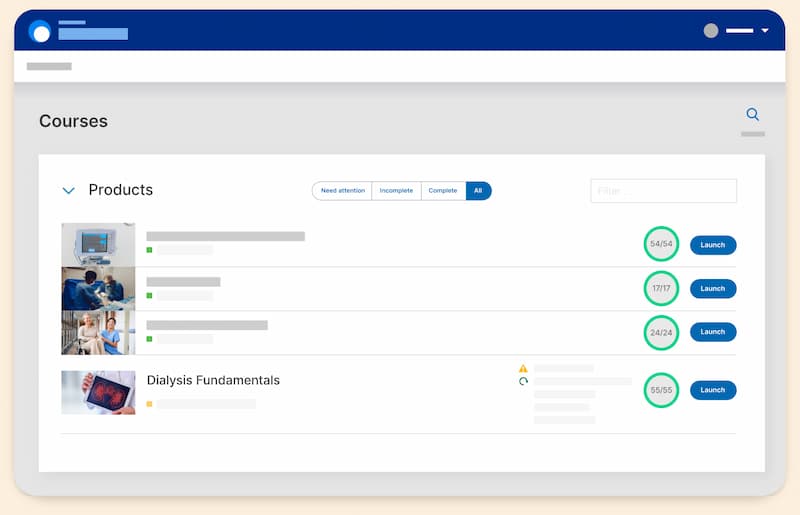Improving Efficiency and Effectiveness of Intensive
New-Hire Training
Customer Story: Retail Healthcare Leader
How a Retail Healthcare Leader Is Planning to Impact Performance with Personalized Onboarding
About the Company
This organization is the United States’ largest retail healthcare provider in their area of specialty, accredited by the National Committee for Quality Assurance (NCQA). They provide comprehensive care and complex chronic condition management to patients nationwide, at all stages of their disease. They have over 200,000 patients in the US and employ more than 65,000 people in over 2,700 locations.
.jpg?width=800&height=553&name=1---About_3x-(1).jpg)
Challenges and Objectives
The company set its goal to transform the way they train new hires. New-hire training for patient care technicians and nurses is intense, encompassing 400 hours of training over 90 days before being cleared to operate on the floor serving patients. The vision is to create individualized learning pathways and reduce the time to competence. This approach will also benefit trainers who bear a heavy burden in shoulder-to-shoulder training as they lack insights into the prior experience of each trainee. New hires tend to get overwhelmed by the amount of knowledge they are expected to acquire, retain, and apply, so making training more engaging, relevant, and digestible in a way that builds confidence is vital. Lastly, leadership seeks greater insights into the competencies, strengths, and weaknesses of each employee to make more informed workforce planning decisions.
The company trains eight to ten thousand new employees every year including both patient care technicians (PCTs) and nurses.
It takes a new employee approximately 400 hours of training across the first three months of employment to be properly qualified and certified to perform their duties.
The standard curriculum for onboarding is not implemented consistently resulting in significant variations in training results.
The onboarding process is overtaxing and burning out their existing employees who are called upon to act as trainers or preceptors while also managing their current job.
Trainers do not have visibility into new hire skills or training needs which lead to inefficient training efforts.
The overall goal is to reduce the aggregate time it takes for new hires to achieve requisite competency by at least 10%.
Solution
The company is partnering with Realizeit to transform their onboarding training for their two critical frontline roles. There is tremendous variation in prior knowledge among new hires and differing competencies between the two roles. Training takes place across their 2,700 locations, making consistency a challenge.
Personalized New-Hire Training
- Delivery of a 400-hour onboarding curriculum.
- A higher proportion of self-guided learning to reduce the load on overburdened trainers.
- Blended multi-modal learning including live interaction with preceptors, site managers, and regional directors.
- Curriculum automatically personalized based on existing knowledge.

Analytics and Integrations
- Real-time analytics to give preceptors insight into each traineee's knowledge gaps to focus on areas to improve and avoid wasting time.
- Assurance of mastery of the material through eLearning-based assessments and live observation with return demonstrations.
- Integration with the LMS, work planning, scheduling, and more.

Why Realizeit?
The legacy training for new hires is currently using a one-size-fits-all approach that does not factor in employees’ prior knowledge or experience. Realizeit’s ability to continually assess existing knowledge and gaps around essential role-based competencies will enable the healthcare provider to deliver personalized, adaptive learning to meet each new hire’s specific needs. One-on-one training will now be more efficient as trainers are aware of the new hires’ prior knowledge and current gaps. This will not only help the large number of annual new hires but will improve the overall workload for the current staff of 65,000+.
Personalized Onboarding
Realizeit expanded the thinking of what was possible to create a personalized onboarding experience
All Stakeholders
Realizeit showed it could improve not only the learner’s experience but also the experience of the trainers, the site leaders, and the overall business leaders.
Flexibility
The Realizeit system provided flexibility and future ability to integrate into the existing LMS and scheduling systems, ensuring it would add long-term value.
Benefits and Results
The program will deliver a more effective and efficient onboarding experience, including:
Savings
Savings on labor and reducing strain on preceptors by transferring more of the responsibility to the new hires as they learn more content from self-guided modules.
Efficient and Effective
More efficient and effective coaching by providing preceptors with information via their mobile device ahead of each training session showing exactly what their new hire trainee does and does not know.
Speed to Competency
Faster speed to competency by adapting the learning journey based on prior knowledge
Onboarding Experience
Improve the onboarding experience for the new hire through a clear learning journey tailored to each person’s experience and understanding of the material
Confidence of Learners
Improved confidence of learners to perform in their new role as feedback and coaching is tailored to each individual
Reduced Turnover
Reduced turnover in the PCT and Nursing roles based on a more engaging and positive onboarding experience
Improved Visibility
Improved visibility for the supervisor of each center to see detailed progress of new hires so they can staff accordingly
Preparation
More efficient scheduling and planning due to accurately knowing the preparation level and readiness of each new hire
Consistency
Greater consistency in training across all 2,700 locations, reducing risk of new hire errors that put patients and the company at risk
Conclusion
Onboarding often requires an intensive curriculum that is delivered to new hires with a wide range of skills. This is often the case in healthcare where patient safety is a key concern. Training new hires can also create a burden on current employees who are called on to serve as preceptors while still having a full load of other duties.
Realizeit provides the solution to personalize learning for faster speed to competency by adapting to each learner’s prior knowledge. The multi-modal learning experience is more engaging, and trainers receive the information they need to focus on areas of need rather than blindly covering material that is already understood. The overall result is a more efficient onboarding process that creates a more engaged workforce that is equipped to provide better care for patients.

Want to learn more?
To discover more about how Realizeit can be your guide to personalizing learning for performance through its adaptive platform, contact us to get in touch.